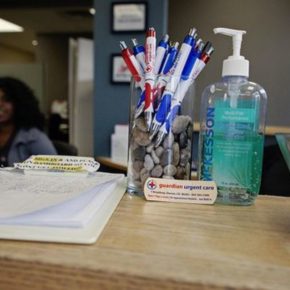If only my parents had sought counsel from a psychic when I came around. She (I’m assuming this psychic is an old woman, hunched over her crystals and spell books, unruly gray hair pinned sporadically with colorful beads and feathers. It’s my imaginary fantasy, okay?) would have foretold a future teeming with tissues, eye drops, and pills. Lots of pills. Had she been a fiscally attuned psychic, she may have offered insight into stock investments with companies like Kimberly-Clark, Bausch + Lomb, or Pfizer.
My lifelong experience with allergies has equipped me with memories of terrifying testing procedures, weekly shots, exaggerated colds, and missing out on fun activities like playing in piles of leaves or backyard camping.
Most notable of these memories, however, were the medieval methods of testing for which allergens threatened to do me in. I recall the five-year old version of myself being physically subdued while some sadistic nurse approached wielding a mat intended for my bare back. A mat housing roughly eight hundred syringes containing droplets of potentially harmful toxins (mind you, this probable hyperbole stems from the mind of a highly imaginative child).
Fast-forward to the year 2013, when the much older (and obviously wiser) me walks in to Guardian Urgent Care to get her allergies tested at the urging of a friend. I spend the days leading up to my appointment convincing myself that — max — I will have to endure ten, maybe fifteen injections to my forearm. I’m tough, right?
I’m greeted by the sweet and lovely Marinda Chhay-Baldi, who escorts me to the exam room. She is all smiles and appears reassuringly calm. “If she’s calm, I’m calm,” I think to myself. Once the door closes, she hands me a gown and hits me with it: “Please take off your top and put this gown on, backside open. Then lie face-down on the table and I’ll be right back.”
Immediately, years of inflated flashbacks flooded my mind while I frantically contemplated an escape plan. “Uh-oh, something has just come up and I must leave now,” and “I’m feeling a bit faint; maybe we should reschedule” suddenly sounded like excellent solutions.
Now, with wisdom comes the ability to step back and look at situations with an objective, realistic perspective. I was able to talk myself down as I decided that whatever horrors lay before me I would simply get my revenge in the pages of 303.
I hear a knock on the door to find out if I was ready for her to come in. Marinda rolls in a cart with — I’m guessing hundreds — of allergens just waiting to inflict red hives and puncture wounds upon my poor back. I blurt out, “I’m a bit weary of needles, so I should warn you – it’s likely that I will pass out.” Her reply? “Oh, that’s okay, I’m not going to be using any needles. These prongs will merely be placed on your skin and marked to see if any reaction occurs after about fifteen minutes.” (I’m paraphrasing here)
I nearly leapt from the exam table to give her a big hug.
So overjoyed by this sudden turn of events that, when it was all over, I asked Marinda a few questions about the 100% painless procedure (called AllerVision).
303: Who at Guardian Urgent Care does this testing?
Marinda: There are currently 3 techs who are able to perform the allergy testing. We are working on training all of our health technicians to be capable of performing this test. We have a range of medical assistants, EMT-Basics, EMT-Paramedics and a Registered Nurse. After the testing the patient will sit with one of our medical providers (PA-C or MD) and they will have a consultation.
303: Does insurance cover the testing?
Marinda: Most insurance companies will cover the actual testing portion but most insurance companies will not cover the drops [formulated for each individual based on the results of the exam]. However if a patient has not met their deductible with their insurance company they will most likely pay for their visit until the deductible is met.
303: When is the best time of year to get tested for allergies?
Marinda: Anytime of the of year is great for testing. The human body will always have the antibodies against what the person is allergic to so they will always present with symptoms during testing.
Another thoughtful concept provided by the merciful souls at AllerVision is that each test is unique to what region of the country you reside in. My test was entitled “Mountain Allergy Skin Test”, and included foliage and spores found in and around Colorado. Pretty smart, yeah?
It’s probably a good idea to learn exactly what is making you sneeze, and I have never found a better way to do that than this. Unless you enjoy walking around in a perpetual state of antihistamine overdose, that is. Those days are finally over.
 Jodilyn Stuart is the 303 Health & Sports desk editor, owner of ModaBody Fitness, and has been a professional fitness geek since 1997. If you have questions, feel free to email at: Jodilyn@303Magazine.com
Jodilyn Stuart is the 303 Health & Sports desk editor, owner of ModaBody Fitness, and has been a professional fitness geek since 1997. If you have questions, feel free to email at: Jodilyn@303Magazine.com




